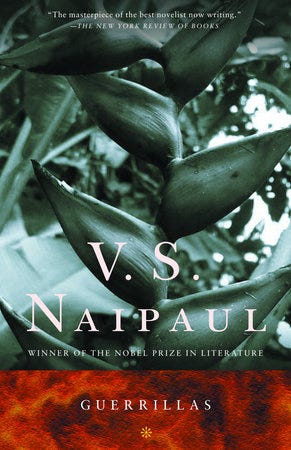Guerillas
by V.S. Naipaul
V.S. Naipaul was the first writer I’ve ever encountered from the brown-skinned, postcolonial world who turned a fiercely critical eye back on his own people. Naipaul was a famous curmudgeon, not a very nice guy, and spared no ones feelings. He was accused by many of his other postcolonial writers of being a sort of Uncle Tom-figure, who wrote, in the words of C.L.R. James, “what the whites want to say, but dare not”. Unlike most of our contemporary sellouts, who tend to be merely low-IQ grifters, Naipaul was extremely intelligent and erudite. Even his worst detractors had to admit he had an incredible gift with the English language. Most valuably, however, as many in India and other places later acknowledge, a lot of the time his criticisms had the sting of truth. He saw the pathologies of the developing world because he himself had been raised with them.
Guerillas (1975) is a fictional story that takes place on a Caribbean island roughly based on Naipaul’s homeland of Trinidad. The plot is vague and poorly developed, but roughly speaking its based on a real-life island rebel leader named Michael X about whom Naipaul published a famous essay years earlier. By the 1970s, people were already becoming cynical about revolutionaries and this book was about as cynical as it gets. The leader of the guerilla movement on this unnamed island spends most of his time thinking about sex, committing act of sexual violence, and talking to his white handler. The followers of the movement are mostly sad and pathetic young people, many literally children, as well as some white foreigners who find the leader as a useful vehicle for addressing their own frustrations with the world.
What seems romantically political from the outside is often deeply personal and ugly when viewed up close. That is a theme that Naipaul often returns to in his works. Joan Didion said that Guerillas was a huge influence on her and I can see why: She was a fellow skeptic about the postwar revolutionary culture of the masses and the Third World. To be honest, I’m a bit used to Naipaul’s arguments and this book failed to shock or awaken anything in me. While eruditely written enough, it was also somewhat shorter on Naipaul’s literary gifts. But he did still have a few gems, like this timeless sendup of the press:
“They grumbled – journalists, politicians, businessmen – responding week by week to the latest newspaper crisis and television issue; they echoed one another; they could become hysterical with visions of the country’s decay…And failure always lay with someone else: the people who spoke of the crisis were themselves placid, content with their functions, existing within their functions, trapped, part of what they railed against.”
Who else has such a keen eye for reality today? Guerillas is a solid novel even if it isn’t Naipaul’s best.

